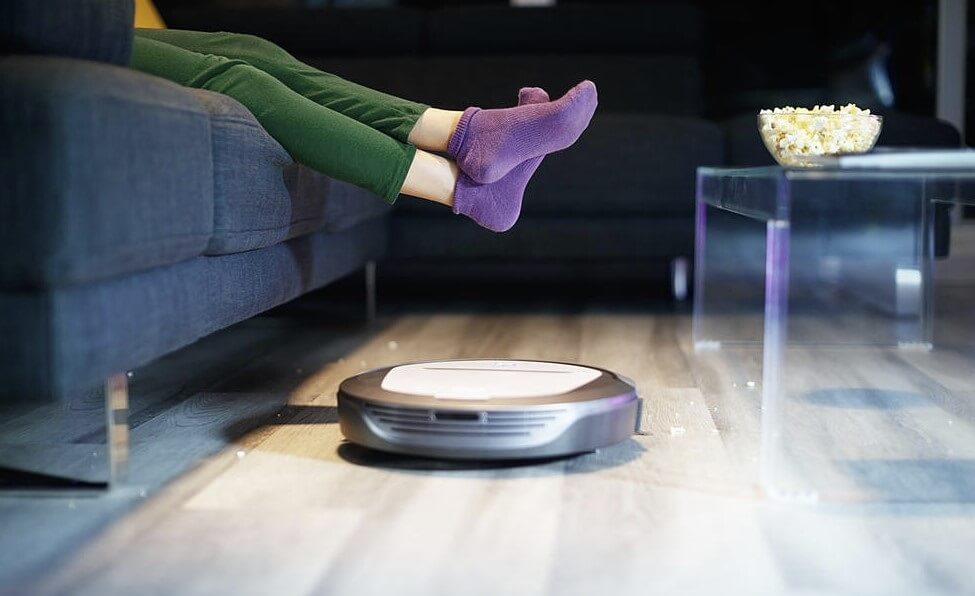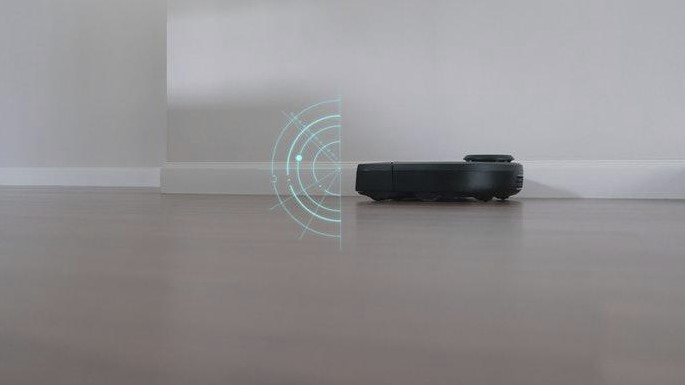Robotic vacuum cleaners are an excellent solution for keeping your home clean, without having to move around.
However, if you work from home and/or have kids and pets, the nighttime might be the only ideal time to run the vacuum cleaner. But can your robot cleaner work at night?

While the nighttime might be the best time for your robotic vacuum cleaner, it can pose some challenges. For example, working in the dark, noise, and human intervention when the robot fails.
That being said, your robot can clean your house at the night. You just need to create conducive conditions for it to run.
Contents
How does a robot vacuum cleaner work?
Robotic vacuum cleaners are just like manual cleaners with one main distinction – self-navigation. So, how do they navigate themselves and decide on the areas to clean?
Given that they are not human and can’t see, the question might sound complicated. However, it is quite easy – they use sensors to navigate, determine where to clean, and measure where and how far they have traveled.
Robotic vacuum cleaners come with several types of sensors for navigation. They include:
- Obstacle sensors – also known as bump sensors, are located on the bumpers, where they detect obstacles such as coffee tables, sofas, chairs, and stray items.
- Cliff sensors – these are usually located at the front of the vacuum cleaner, and they prevent the robotic cleaner from tumbling down the stairs.
- Wall sensors – these help to detect walls and clean alongside without bumping against them
Some robotic cleaners, such as the Roomba robot cleaner, can create and store maps of your house. This is made possible with the use of infrared camera sensors. With the maps and sensors, the robot can navigate around with minimal intervention.
But how about cleaning different rooms? Do robot vacuums go from room to room? Most robotic cleaners with advanced navigation can clean one room after the other, as long as there are no stairs between.
Can you run a Roomba at night?
While cleaning with minimal intervention is possible, cleaning in the dark for a robotic vacuum can be a whole other issue. The following factors may affect how your robot vacuum works at night:
1. Light considerations
Does a robot vacuum cleaner need light? Yes, most of them do. Even with infrared sensors, they might still need ambient light for some of the other sensors to work.
Therefore, without light, your robot might keep on bumping things, thus taking too much time and causing too much noise. On top of that, if your robot is unable to navigate the obstacles, it will return to the docking station, or even get stuck.
2. Noise levels
Another consideration when using a robotic vacuum cleaner at night is the noise level. While they are not noisier than manual cleaners, robot vacuums still produce significant noise levels. On top of that, they take much longer to clean than manual vacuums.
Therefore, if you are using the vacuum at night, you have to contend with one or two hours of constant buzzing. It might not be too loud to drive you crazy, but you might have a hard time falling asleep while it is running.
Tips for using a robotic vacuum cleaner at night

While there are some challenges to running a Roomba at night, it is not entirely impossible. And with the tips below, you can get the best out of your robotic vacuum:
1. Buy a robot with advanced navigation
To effectively clean in the dark, your robot needs to have an advanced navigation system. The best one should have multiple sensors, mapping technology, and a camera. This way, it will avoid obstacles, walls, and stairs much easier.
2. Do a test run
Before scheduling your robot to run at night, execute a few test runs and observe how it does.
Take note of any obstacles that are hard to navigate so you can remove them when the robot self-navigates. On top of that, trial runs will help the robot map your house and learn how to navigate at night more efficiently.
3. Turn on the lights
Is your robot having a hard time cleaning in the dark? Simply turn on the lights. If the lights can be programmed, the better.
Simply schedule them to come on as your robot starts cleaning and then go off once finished.
4. Put away stray items
Stray items such as electrical cords, toys, clothes, and others will give your robot a hard time cleaning.
In the dark, it might almost be impossible. So, before you schedule your robot to run, make sure there are no items that can create issues.
5. Create map zones and barriers
If your robot has mapping technology, you can use it to optimize navigation.
Create maps of where it can clean and barriers for where not to venture. This will give it an easier time, even when navigating in the dark.
Conclusion
Do you have a house full of pets and children? Do you hate having to constantly tidy up the place? A robotic vacuum cleaner can be your new best friend. And what’s more, you can schedule it to run at night with minimal interruptions.
However, running your robotic vacuum cleaner in the dark can be problematic. But, with the above tips, you can improve the nighttime cleaning sessions and get the best out of your robot.
Related Guides
